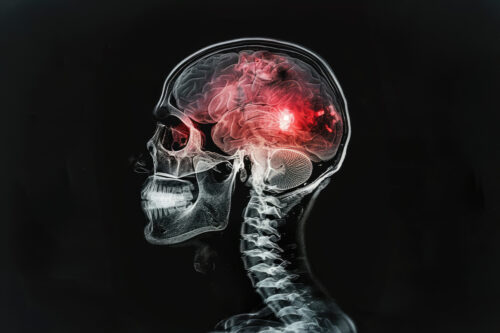
When chronic alcohol use depletes the body of essential nutrients, the brain can suffer permanent damage in ways you may have never imagined. Wernicke-Korsakoff Syndrome, commonly called “wet brain,” is one of the most severe forms of alcohol-related brain damage, yet it remains largely preventable through proper medical care and nutritional support.
At Davis & Davis, we understand the complex medical issues surrounding brain injuries, including those caused by nutritional deficiencies and medical negligence. Our Houston-based medical malpractice attorneys have nearly 70 years of combined experience handling cases involving brain damage, misdiagnosis, and failure to provide appropriate medical care. Therefore, you can rely on us to fight for your rights and secure the compensation you deserve.
What Is Wernicke-Korsakoff Syndrome?
Wernicke-Korsakoff Syndrome is actually two related conditions caused by severe thiamine (vitamin B1) deficiency. The syndrome progresses through two distinct stages, starting with Wernicke’s encephalopathy, causing confusion, difficulty walking, and abnormal eye movements. Without immediate treatment, this condition can progress to Korsakoff’s syndrome, which involves severe memory problems and the inability to form new memories.
While the condition most commonly affects people with chronic alcoholism, it can also occur in patients with malnutrition, eating disorders, or certain medical conditions. Because thiamine is essential for glucose metabolism in brain cells, without adequate levels, brain tissue begins to deteriorate.
What Are the Causes and Risk Factors of Wernicke-Korsakoff Syndrome?
Chronic alcohol consumption creates the perfect storm for thiamine deficiency. Alcohol interferes with the absorption of thiamine from food, reduces its storage in the liver, and impairs its conversion to the active form the brain needs. Additionally, the following medical conditions can lead to thiamine deficiency:
- Prolonged vomiting or diarrhea
- Eating disorders like anorexia nervosa
- Gastric bypass surgery
- Kidney dialysis
- Severe infections or fever
- Hyperthyroidism
- Prolonged fasting or poor nutrition
Recognizing the early signs of Wernicke-Korsakoff Syndrome can be life-saving, but they often develop gradually, making them easy to miss or misattribute to other causes. Wernicke’s encephalopathy typically presents with confusion, difficulty coordinating movements, and problems with eye movements. You may feel disoriented, have trouble walking steadily, or experience involuntary eye movements called nystagmus.
If left untreated, the condition can progress to Korsakoff’s syndrome, characterized by severe memory problems. You may lose the ability to form new memories, experience gaps in your memory, and sometimes create false memories to fill in the blanks.
How Medical Malpractice Can Cause Wernicke-Korsakoff Syndrome Brain Damage
Time is critical when treating Wernicke-Korsakoff Syndrome. Early intervention with high-dose thiamine can prevent progression to the more severe Korsakoff’s syndrome and may reverse some symptoms. Healthcare providers should recognize the warning signs, especially if you have risk factors like chronic alcoholism or malnutrition. Proper diagnosis requires a thorough medical history, physical examination, and sometimes blood tests to check thiamine levels.
Medical professionals have a responsibility to recognize and treat thiamine deficiency, particularly in high-risk patients. Failure to diagnose, properly treat, or monitor this condition can result in permanent brain damage. Healthcare providers should be especially vigilant with patients undergoing procedures like gastric bypass surgery, those with chronic alcoholism, or patients receiving total parenteral nutrition without proper vitamin supplementation.
What Are Your Legal Options for Medical Malpractice-Related Brain Damage?
When healthcare providers fail to prevent or properly treat Wernicke-Korsakoff Syndrome, you may have grounds for a medical malpractice claim. These cases often involve complex medical issues requiring thorough investigation and skilled legal representation.
Successful claims typically require proving your healthcare provider failed to meet the standard of care expected in similar circumstances. This might involve demonstrating they should have recognized the risk factors, ordered appropriate tests, or provided timely treatment. Our skilled medical malpractice attorneys can help evaluate your case by reviewing medical records, consulting with medical professionals, and determining whether negligence occurred.
Get Help From Skilled Medical Malpractice Attorneys at Davis & Davis
If you’ve suffered brain damage due to untreated or improperly treated Wernicke-Korsakoff Syndrome, you need attorneys who understand both the medical complexities and legal challenges involved. At Davis & Davis, our trial-tested legal team has dedicated their careers exclusively to fighting for victims of medical negligence.
We understand the devastating impact brain injuries can have on patients and their families, and we’re committed to helping victims obtain the compensation they deserve. Our attorneys work with medical professionals to build strong cases and have successfully handled more than 300 jury trials throughout our combined 70 years of practice. Contact us at (713) 781-5200 or fill out our contact form to schedule your free case evaluation.









